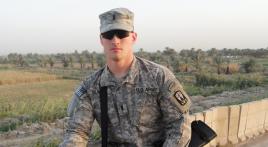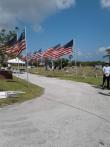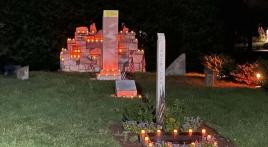Clearly displayed in my parents’ home was a large photograph of my father’s first cousin (my first cousin once removed), George Dilboy. He was the first Greek-American to be awarded the Medal of Honor in World War I. George Dilboy seems to have had the military woven into his DNA.
As a 17 year-old U.S. citizen he traveled to Greece to fight with the Greek army against Turkey in the Balkan Wars of 1912-1913. Returning to Massachusetts after those battles, he completed school and subsequently joined the U.S. Army. He served under General John “Black Jack” Pershing during the Mexican Border War from 1916 to 1917.
In 1917 Pfc. Dilboy arrived in France as a member of an Army infantry division. He saw action in the Argonne Forest, at the village of Apremont and in Belleau Wood. In July 1918, during the Aisne-Marne counteroffensive, his platoon was taken under fire by a German machine gun. With bayonet fixed, he attacked the enemy. A short distance from the gun emplacement he was hit and mortally wounded. However, he continued firing, killing some of the machine gun crew and scattering the others.
His Medal of Honor citation states, in part:
“For conspicuous gallantry and intrepidity, above and beyond the call of duty, in action with the enemy on July 18, 1918, near Belleau, France. After his platoon had gained its objective along a railroad embankment, Pfc. Dilboy, accompanying his platoon leader to reconnoiter the ground beyond, was suddenly fired upon by an enemy machinegun from 100 yards. From a standing position on the railroad track, fully exposed to view, he opened fire at once, but failing to silence the gun, rushed forward with his bayonet fixed, through a wheat field toward the gun emplacement, falling within 25 yards of the gun with his right leg nearly severed above the knee and with several bullet holes in his body. With undaunted courage he continued to fire into the emplacement from a prone position, killing 2 of the enemy and dispersing the rest of the crew.”
Honored by General Pershing as one of the 10 great heroes who died in France during Would War I, Pfc. Dilboy is buried at Arlington National Cemetery. A VFW post and a sports stadium in Somerville, Mass., are named after him. There is also a bronze memorial honoring Dilboy in Somerville and a statue of him at the VA Hospital in Hines, Ill. In 2015 the Hines VA Hospital honored him with a special Medal of Honor ceremony. That same year the U.S. Citizenship and Immigration Services dedicated its new facility in Detroit in honor of Pfc. Dilboy.
I have no doubt that, had he lived, George Dilboy would have become a proud member of The American Legion.
A cousin's legacy
Venice, FL
June 25, 2017
Submitted by:
George Collias, No-Vel Post 159




